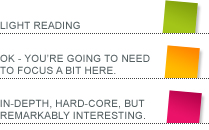Writing for an online audience is not the same as writing an email to a friend or even a potential client. Online content also differs depending on the content platform you are writing for, as we’ve previously addressed. You can’t just run a spelling and grammar check on that 2,000 word article you wrote and consider it good enough. (Though please, please, do always run a spelling and grammar check, at the very least. At best, have your copy professionally edited and/or proofread.)
Who are you writing for?
It’s important to be very clear about your target audience. When you’re planning a company website, you need to have this audience clearly defined, because it will have an impact on the design and architecture of the site as well as the content. Your target audience will be your first thought when deciding whether to use very formal or more informal language, and will also be a deciding factor when thinking about what type and depth of information to include. An investment firm targeting older, wealthy clients needs to establish its long-term credentials and appeal to a fairly educated and conservative market. The same firm trying to attract young entrepreneurs needs to show that it understands the changing nature of business and is willing to take risks on good ideas. Neither target market will appreciate ‘textspeak’ in your content, though, because both need to take you seriously.
A sidenote on ‘textspeak’ and other trends
Ur nvr gonna appeal to enny1 wt ths. All ull do is mk ppl LOL at u. no matter how hip & c001 yr product is.
What are you writing about?
Before you start writing, be very clear what the point of a particular piece of content is. You’re going to try and explain this product or service as clearly and briefly as you can. Try to think about how your target audience will think of this product. A List Apart has a wonderful example <http://www.alistapart.com/articles/a-checklist-for-content-work/> of how it can really put off a potential customer when what they want is a tack hammer and you’re trying to sell them an ‘Upholstery Hammer (Home Use)’.
Quick Tip – the Social Media précis: On Twitter you have only 140 characters per post. On Facebook you can do more, but it’s better to keep it short. Think about how you would précis the article you’re about to write in order to promote it on Twitter. This will help you to clarify your thinking and find shorter ways to express it.
Online reading habits
Since Nielsen Norman first started studying online reading habits in the 1990s, things have not changed that much. More recent studies have shown that online readers still scan pages quickly to find information, and are unlikely to start reading long paragraphs. So, keep it short, keep it to the point, and use clear subheadings to break up information if you need to.
Obviously, this article doesn’t necessarily follow the above rules, but sometimes blog articles are different.
How is writing for my website different from writing for my blog?
First and foremost, your website officially represents your company. Unless you are actually the brand (and for many writers, performers and creators this is the case) the website should be about the product or service on offer and you should be an ‘invisible’ author.
In almost all cases, writing on your website is going to be more formal and more focussed than writing on your blog. It also needs to have greater longevity. The majority of company websites are static – the website may have a news feed or an associated blog, but the bulk of the content stays the same. Your website is your online prospectus, while your blog is more like a journal.
On a blog, you should be adding posts relatively frequently. Your posts needn’t have longevity, because you can always refute, update or add to them in a later post. You can use a blog to respond to current events in your industry quickly and easily.
Blogs are traditionally more personal, so you can allow your own personality through a little more in your writing. In fact, you should take a slightly more personal tone – blog readers like to feel more connected to the author, and one reason for having a blog is to allow your customers to ‘get to know you’. For this reason, you can also get away with longer articles, and longer paragraphs, on a blog, as long as they’re interesting and well-written.
Do the spellcheck
I’m going to say this a lot. Always, at minimum, check your spelling and grammar. Sloppy writing on a website makes your customers feel that your company is sloppy. You can get away with a little more on a blog, but you’ll still look like a twit who doesn’t know how to press the ‘spellcheck’ button.


